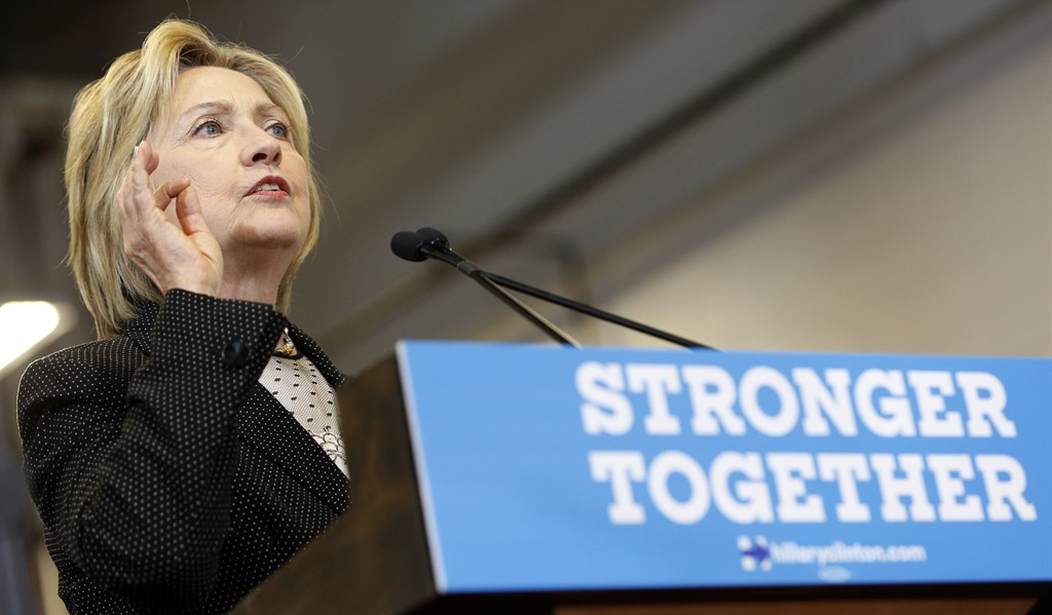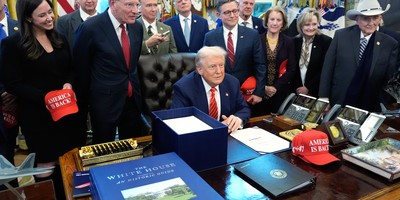Hillary Clinton is a seasoned liberal politician, but one with few core beliefs. Her positions on subjects such as gay marriage, free-trade agreements, the Keystone XL pipeline, the Iraq War, the Assad regime in Syria and the use of the term "radical Islam" all seem to hinge on what she perceives 51 percent of the public to believe on any given day.
Such politicians believe truth is a relative construct. Things are deemed false by politicians only if they cannot convince the public that they are true -- and vice versa. When the majority of Americans no longer believe Clinton's yarns about her private email server to the point of not wanting to vote for her, then she will change her narrative and create new, convenient truths to reflect the new consensus.
Donald Trump is an amateur politician but a politician nevertheless. He is ostensibly conservative, but he likewise seems to change his positions on a number of issues -- from abortion to the Iraq War -- depending on what he feels has become the majority position. And as with Clinton, Trump's idea of truth is defined as what works, while falsity is simply any narrative that proved unusable.
Politicians glad-hand, pander and kiss babies as they seek to become megaphones for majority opinions. But ideologues are different. They often brood and lecture that their utopian dreams are not shared by the supposedly less informed public.
To gain power, of course, ideologues can temporarily become political animals. Barack Obama ran in 2008 on popular positions such as reducing the national debt and opposing gay marriage and immigration amnesties, only to flip after he was re-elected and no longer needed to pander to perceived majority opinions.
Recommended
But otherwise, Obama the ideologue seems to believe that big redistributive government is always necessary to achieve a mandated equality of result -- regardless of whether it ever works or should work in reality. He opposes a reduction in capital gains tax rates even though he concedes that such cuts might bring in more revenue.
The administration has deemed the Affordable Care Act successful even though Obama's assurances that it would lower deductibles and premiums, give patients greater choices, and ensure continuity in medical providers and plans have all proven to be untrue.
No matter: Obamacare fulfills the president's preconceived notion that state-mandated health care is superior to what the private sector can provide.
Abroad, Obama starts from the premise that an overweening U.S. is not to be congratulated for saving the world in World War II, winning the Cold War and ushering in globalization. Instead, its inherent unfairness to indigenous peoples, its opposition to revolutionary regimes and its supposed interventionist bullying disqualify it from being a moral and muscular leader of the world.
As a consequence of all this, facts often must be created to match pre-existing ideology.
A homophobic, radical Islamic terrorist in Orlando shouted "Allahu Akbar" as he mowed down the innocent in a gay nightclub. He called 911 to make sure the world knew that his killing spree was in service to the Islamic State. And in the midst of his murdering, he even called a local TV news station to brag on his jihadist martyrdom in progress. No matter. To Obama, who asserts that radical Islamic terrorism, which he refuses to identify in such terms, poses little threat (far less of a threat, he has said, than the dangers posed by accidental falls in bathtubs), the Orlando shooting was instead a symptom of a lack of gun control or endemic homophobia -- anything other than what the killer himself said it was.
Guns, of course, had nothing to do with the 3,000 people killed on 9/11, with the Boston Marathon bombing, or with recent terrorist attacks in Oklahoma and at the University of California at Merced perpetrated by blade-wielding assailants. Tight restrictions on semi-automatic weapons could no more stop shootings in Europe than stop an epidemic of inner-city shootings in Chicago. No matter: The Orlando shooting must be ascribed to the availability of guns rather than to radical Islamic terrorism.
In both word and deed, Iran, Cuba and Turkey are revolutionary societies in turmoil that have often voiced anti-Americanism. But to Obama, who at times has warmed up to all three, those regimes fit his deductive notion that America's past behavior has earned it understandable antipathy from countries with legitimate grievances.
Bipartisan analyses agree that the withdrawal of all troops from Iraq in December 2011 threw away the victory obtained by the American surge of 2007, eroded the foundation of the nascent Iraqi democracy, and helped to birth and empower the Islamic State.
But to an ideologue like Obama, the withdrawal simply reflected a universal truth that the U.S. must get out and leave the Middle East to its rightful owners -- even if the president has been forced to send nearly 5,000 troops back into Iraq.
In general, politicians are rank opportunists, but at least most of them are malleable and attuned to public opinion.
But ideologues are far more anti-empirical -- and thus dangerous.

























Join the conversation as a VIP Member